Diplomatic Bluebook 2024
Chapter 4
Japan's Diplomacy Open to the Public
2 Japanese Continuing Working in the International Community
(1) Japanese Continuing Working in International Organizations
International organizations are founded to serve the common interest of the international community. People of various nationalities join these international organizations, and draw on their skills and traits to create an environment where people of the world can live in peace and enjoy prosperity. Many international organizations are working to address global issues that no one country can solve alone, including Russia's aggression against Ukraine, the Israeli-Palestinian situation and the resulting food and humanitarian crisis, as well as the environment, climate change, refugees, infectious disease control, sustainable development, disarmament and non-proliferation, conflict prevention and peacebuilding, energy, disaster management, labor, human rights and humanity, gender equality, etc.
Talented individuals with specialized knowledge, passion and capabilities to contribute to the world's interests are needed so that international organizations can competently perform their duties and fulfill the roles expected of them. Japan makes policy contributions as a member country of these international organizations, and makes assessed and voluntary contributions. In addition to these efforts, the activities of Japanese staff are also an important part of Japan's contributions. Additionally, a larger number of talented Japanese people continuing to work in international organizations will further enhance Japan's presence in the international community more visibly. Japanese staff are involved in various fields and duties at different locations, but they share the same goal of solving various issues facing the international community (See the Columns on pages 340 and 341). Moreover, encouraging the employment of more Japanese nationals who can continue working on the international stage with professional experience at international organizations will in turn lead to enrichment of Japan's human resources, contributing to the development of Japan as a whole.
Currently, Japanese nationals are serving in important posts at international organizations that include the United Nations (UN). Japanese nationals are actively performing leadership roles at organizations such as the Universal Postal Union (UPU), a specialized agency of the UN that Mr. METOKI Masahiko assumed leadership of in January 2022, the World Customs Organization (WCO), and the Asian Development Bank (ADB). In addition, for many years Japan has sent a succession of Japanese judges to international courts such as the International Court of Justice (ICJ), the International Tribunal for the Law of the Sea (ITLOS), and the International Criminal Court (ICC). In light of the importance of international organizations for addressing global challenges, securing the top and other important posts that contribute to strengthening ties between Japan and international organizations, is an important challenge. On the other hand, the top and other important posts of international organizations are not something that can be secured overnight. It is necessary to make a finely tuned response by adopting a long-term perspective while cultivating suitable personnel.
Currently, 961 Japanese nationals (as of the end of 2022; figures gathered by MOFA) are working as professional-level or higher-level staff in UN-related agencies around the world, which is a record figure. With the aim of further increasing Japanese personnel, the Government of Japan has set a target of 1,000 Japanese nationals working for UN-related agencies by 2025. To this end, in collaboration with universities, related ministries and agencies, and organizations, MOFA is actively recruiting, training and supporting Japanese nationals who can continue working in the international organizations and make a contribution on the global stage. As part of these efforts, MOFA runs the Junior Professional Officer (JPO) Programme, which sends young Japanese nationals to positions in international organizations for a term of two years, with the aim of gaining regular staff positions in such organizations after the term. MOFA also runs a program to support the advancement of Japanese nationals who can be future managerial candidates by offering them mid-career and higher professional experience. In addition to encouraging the employment of more Japanese nationals through these efforts, MOFA is also working to coordinate with international organizations and gather information for the recruitment and promotion of Japanese staff.
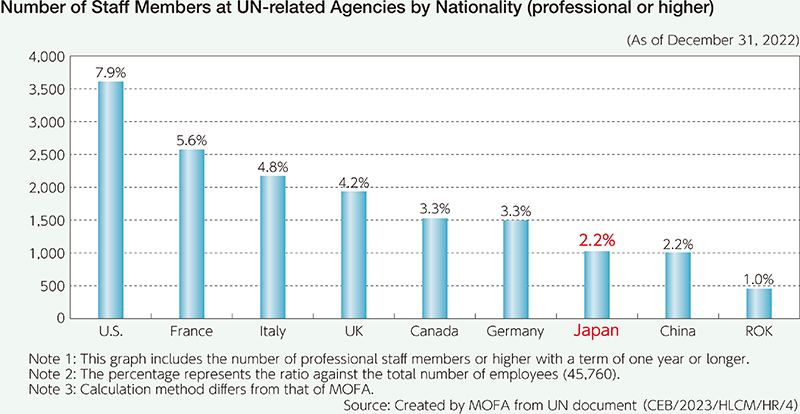
For Japanese nationals who wish to work for international organizations, the MOFA Recruitment Center for International Organizations continually provides useful information of vacancy announcements at international organizations on its official website and through mailing lists, social media such as Facebook, X (formerly Twitter), and LinkedIn, as well as video sharing platforms such as YouTube. In addition, the MOFA Recruitment Center for International Organizations works on publicity to provide online career seminars explaining the attractiveness of working at international organizations and methods to apply for a job, and also online explanatory sessions with invited senior Japanese staff working for international organizations and human resource specialists from international organizations.
MOFA will continue to encourage the recruitment of more Japanese nationals working in international organizations and support their promotion, so that a larger number of competent Japanese nationals who have high aspirations and passion to contribute to solving global issues can take part in international organizations.
 Exterior view of the UPU International Bureau building (Headquarters: Bern, Switzerland; Photo: UPU)
Exterior view of the UPU International Bureau building (Headquarters: Bern, Switzerland; Photo: UPU)The Universal Postal Union (UPU) will celebrate its 150th anniversary in 2024. It was founded with the goal of interconnecting national postal networks (in technical terms, forming a “single postal territory”) to enable people around the world to send mail of better quality to anywhere in the world. In light of the fact that the organization was founded in 1874 under such a noble goal, and that Japan joined the UPU just three years later in 1877, I cannot but feel the greatness of our predecessors.
I have a peculiar connection with the UPU, and this is my third time working there. The first was as Secretary of the Technical Cooperation Department for five years from 1987, engaging in technical cooperation for Asia and Pacific countries; the second time was as Director of the Operations and Technology Department from 2005 to 2014; and for this third time I have served in my current position since January 2022.
At the UPU Congress held in Abidjan in 2021, Mr. METOKI Masahiko was elected as the Director General of the International Bureau of the UPU, the only Japanese head of a United Nations Specialized Agency. Following this, I was dispatched to assist the executive management (which consists of the Director General and the Deputy Director General, elected positions) of the International Bureau. My current role requires me to provide advice to the top of the organization, which calls on me to work with a new perspective.
The top of the organization is required to properly manage the organization, personnel, and budgets while executing operations, but above all else, it needs to achieve the organization's goals. My first task upon arrival was to address the ways to optimize the organization by forming a transition team together with four senior directors. We were able to develop a proposal in three months and carry it through to implementation. I was then involved with preparing the first annual budget under the new executive management. The UPU is a relatively small organization, but since it is a group of employees with different cultural backgrounds, we strive to properly manage the personnel affairs of the entire organization while holding regular meetings with the Human Resources Department.
For its organizational goals, the UPU develops a strategy and business plan at each Congress held every four years for the next cycle. The executive management is tasked to spare no effort to achieve these strategies and plans. The assignments defined therein are to be discussed, depending on the nature, at meetings of the Council of Administration and the Postal Operations Council, which meet twice a year, respectively. It is the exclusive role of UPU staff to prepare the documents for review at those meetings. The executive management needs to ensure that the projects and tasks assigned to each department are progressing without delay. A new progress management dashboard has thus been introduced so that the executive management can be briefed on a monthly basis by each director.
International organizations need to plan and execute numerous different events while communicating with regional organizations and member countries. In October 2023, the 4th Extraordinary Congress of the UPU was held in Riyadh, Saudi Arabia. This successful Congress focused on four pressing issues: (1) how to open up the UPU to stakeholders, (2) postal operators' response to the Sustainable Development Goals (SDGs)/climate change and emissions controls, (3) development of new services for e-commerce, and (4) review of the budget ceiling framework. In June of the same year, the first WCO-UPU Global Conference was held in Tokyo by agreement between the Japanese heads of both the UPU and the World Customs Organization (WCO) (with Mr. MIKURIYA Kunio as Secretary General of the WCO at the time).
It is no exaggeration to say that communication is the key to success in leading an international organization. On a daily basis, projects of all sizes are submitted to the executive management for approval. For my part, I will continue to cheerfully converse with staff members while doing my utmost to provide appropriate advice as needed, keeping in mind these words of INAMORI Kazuo: “Is what we are doing good and right?”
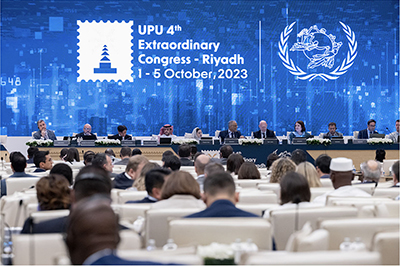
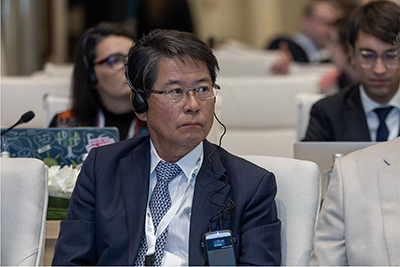 At the Extraordinary Congress of the UPU (left), and the author in the conference hall (right) (October, Riyadh, Saudi Arabia; Photo: UPU)
At the Extraordinary Congress of the UPU (left), and the author in the conference hall (right) (October, Riyadh, Saudi Arabia; Photo: UPU)It has been 20 years since I was deployed to the headquarters of the United Nations World Food Programme (WFP) as a Junior Professional Officer (JPO) in January 2004. Over the past 20 years, I have served in seven duty stations for four UN agencies. The most rewarding of these assignments were the ones in the field - in Egypt, Myanmar, Zimbabwe, Timor-Leste, and Azerbaijan. Be it in Myanmar when Aung San Suu Kyi was released from house arrest in November 2010, or in Zimbabwe when President Mugabe resigned in November 2017, it has been humbling to witness the countries' historical moments and to contribute to the strategic positioning of the UN in these periods.
Since 2016, I have been serving as the Head of the UN Resident Coordinator's Office. Simply put, I am the Chief of Staff to the UN Resident Coordinator, who is the highest-ranking representative of the UN development system at the country level. While the specific activities vary from country to country, essentially my job is to support and coordinate the activities of over 20 UN agencies so that the UN can provide integrated support to the country's national development plans and progress toward the Sustainable Development Goals (SDGs). The word “coordination” might sound like paper-pushing, but the work of the UN Resident Coordinator's Office is like the gift that keeps on giving. Unexpected challenges and issues pop up one after another, with every situation requiring a quick and appropriate response. While coordination of development activities is the core mandate of the UN Resident Coordinator's Office, when a disaster strikes, the job switches to coordinating emergency response. In Zimbabwe, for example, the UN Office for the Coordination of Humanitarian Affairs (OCHA) previously did not have an office in the country, so the UN Resident Coordinator's Office in Zimbabwe took the lead in coordinating the humanitarian assistance for the El Niño-induced drought (from 2016 to 2017) and the emergency response to Cyclone Idai (2019). In addition, shortly after I took on my assignment as the Head of the UN Resident Coordinator's Office in Timor-Leste, the World Health Organization (WHO) declared a Public Health Emergency of International Concern (PHEIC) in response to the spread of COVID-19. While many expatriate staff of the diplomatic missions and international NGOs were repatriated, the UN remained in Timor-Leste with the commitment to Stay and Deliver (remain on the ground and continue to provide assistance even in times of crisis). I can still vividly remember the day - 4 April 2020 - when the last commercial flight from Dili departed. From our residential compound, my family and I looked on as the plane disappeared into the beautiful blue sky. It was a moment when I was reminded of the unique mission of the UN and the immense responsibility and honor of being a UN staff. (As a side note, from June 2020 onward for over a year, monthly WFP-operated chartered humanitarian flights were the only way in/out of Timor-Leste.) In a least developed country (LDC) with a fragile health system, I was dedicated to coordinating the UN's support for COVID-19 socio-economic response, as well as supporting the health and wellness of UN staff and their families.
Finally, there is a reason why I always found it easy to work in every country that I have served over the past 20 years: when meeting national staff or government officials for the first time, they often say “Are you Japanese? I used to work with a Japanese named X, and he/she was a great person.” The reasons they would give for the “greatness” of these Japanese people were usually “competence,” “hard working,” and “humility.” One might think that there is no place for humility when working at a highly competitive organization like the UN. In my experience, however, national staff and government officials, especially those who have worked with many international staff in the field, value the humility of Japanese people. I am grateful to have benefited from the “greatness” of previous generations of Japanese UN staff and the welcome I received in every duty station. For my part, I hope to pay it forward by continuing to serve with sincerity and optimism.
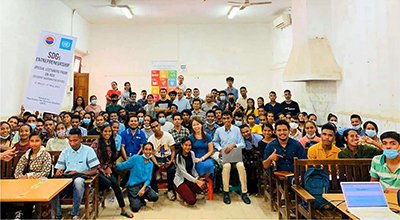 A lecture on the SDGs delivered to students at the National University of Timor-Leste. Young people in every country give me energy and hope. (The author is first row center, March 21, Timor-Leste, ©Chang Won Choi)
A lecture on the SDGs delivered to students at the National University of Timor-Leste. Young people in every country give me energy and hope. (The author is first row center, March 21, Timor-Leste, ©Chang Won Choi)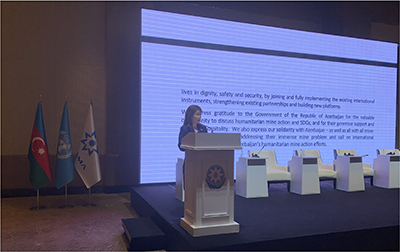 The author reading out an outcome declaration at an international conference on mine action in Azerbaijan (May 2023, Azerbaijan, © UN Resident Coordinator's Office in Azerbaijan)
The author reading out an outcome declaration at an international conference on mine action in Azerbaijan (May 2023, Azerbaijan, © UN Resident Coordinator's Office in Azerbaijan)(2) Activities of Non-Governmental Organizations (NGOs)
A Development Cooperation
From the perspective of developing a diplomacy by concerted national effort through leveraging the capabilities of organizations other than the Government, there is growing significance in roles that NGOs can play in carrying out support activities for developing countries in development cooperation and humanitarian assistance.
Through NGOs, the Ministry of Foreign Affairs (MOFA) actively provides Official Development Assistance (ODA) via financial cooperation in the form of grant assistance (Grant Assistance for Japanese NGO Projects) for economic and social development projects implemented by Japanese NGOs in developing countries and regions. The projects cover a wide range of assistance, including health, medical and hygienic care (e.g., maternal-child health, tuberculosis measures, water and sanitation), rural development (e.g., improvement of agricultural environments and livelihoods), support for people with disabilities (e.g., vocational training and employment support), education (e.g. school construction), disaster risk reduction, and countermeasures for landmines and unexploded ordnances (UXO). In FY2022, MOFA provided funding for 117 projects to Japanese NGOs (57 organizations) implementing Grant Assistance for Japanese NGO Projects in 41 countries and regions in Asia, Africa, the Middle East, and Latin America and the Caribbean. Moreover, the NGO Project Subsidies are provided to improve the project execution capabilities and expertise of NGOs and to support activities that contribute to the promotion of NGO projects.
Additionally, Japan Platform (JPF) was established in 2000 with the aim of conducting emergency humanitarian assistance more effectively and promptly through cooperation and partnerships among the Government, NGOs, and business communities at the time of large-scale natural disasters or conflicts. As of the end of December 2023, 47 NGOs are members of JPF. In 2023, JPF implemented response programs that included assistance to earthquake victims in southeastern Türkiye; assistance to victims of Cyclone Mocha in Myanmar; humanitarian crisis assistance in Sudan; emergency assistance for a large fire in Maui, Hawaii; assistance to earthquake victims in central Morocco; assistance to earthquake victims in western Afghanistan; humanitarian crisis response assistance in Gaza; and emergency response for Afghanistan returnees. Assistance was also provided to refugees and internally displaced persons in Ukraine and neighboring countries; Myanmar, Bangladesh, South Sudan and neighboring countries; and Ethiopia, Yemen, Pakistan, Mozambique, Afghanistan, Iraq/Syria and neighboring countries.
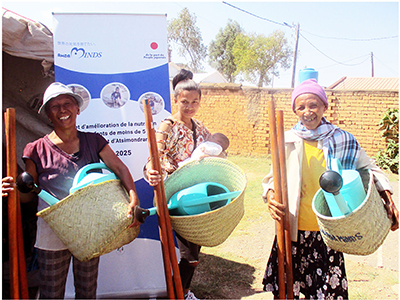 The objects in the women's hands are farming tools for home vegetable gardens that were distributed through a project to support improved child nutrition. “I look forward to using it for field work. I hope to grow leafy greens to give to my kids,” she says with a smile. (Madagascar; Photo: AMDA Multisectoral & Integrated Development Services)
The objects in the women's hands are farming tools for home vegetable gardens that were distributed through a project to support improved child nutrition. “I look forward to using it for field work. I hope to grow leafy greens to give to my kids,” she says with a smile. (Madagascar; Photo: AMDA Multisectoral & Integrated Development Services)In this way, NGOs assume important roles in the area of development cooperation and humanitarian assistance. Positioning such NGOs as strategic partners in international cooperation, MOFA and the Japan International Cooperation Agency (JICA) provide indirect support for NGO activities through various policy measures aimed at enhancing their capability and expertise as well as developing human resources so that NGOs can strengthen the foundation for their activities and perform further tasks. In 2023, MOFA implemented four programs─namely, the “NGO Consultant Scheme,” “NGO Study Program,” “NGO Intern Program,” and “NGO Study Group.”
The plenary meeting of the NGO-MOFA Regular Consultation Meeting, the purpose of which is to promote dialogue and coordination between NGOs and MOFA, was held in November 2022. Meetings of the Partnership Promotion Committee, a subcommittee, were held in July and December 2022 and March 2023, while ODA Policy Council meetings were held in July and November 2022 and March 2023. Furthermore, an extraordinary plenary session was held in September 2022 where a lively exchange of views took place regarding revisions to the Development Cooperation Charter. In addition, recognizing the indispensable role of multi-stakeholder partnerships in achieving the Sustainable Development Goals (SDGs), MOFA has been actively exchanging views with various stakeholders, including NGOs, at the “SDGs Promotion Roundtable Meeting” since September 2016. In March 2023, private sector members of the SDGs Promotion Roundtable Meeting submitted a proposal to the Government regarding the SDGs Implementation Guiding, Principles, sparking a lively exchange of views at the Roundtable and other meetings.
B Partnership in Other Major Diplomatic Areas
The Government of Japan holds dialogues with civil society including NGO representatives and experts on matters related to government reports to be submitted based on various human rights treaties, as well as on the National Action Plan on Business and Human Rights, and the National Action Plan on Women, Peace and Security, which is based on UN Security Council (UNSC) resolution 1325 and related resolutions.
In the area of conventional weapons, MOFA works in cooperation with NGOs in implementing clearance of mines and UXOs, and mine risk education projects, in countries affected by mines and UXOs.
Furthermore, in the area of nuclear disarmament, MOFA has been conducting dialogues with various NGOs and experts. The Government supports the activities of NGOs and others to convey the realities of nuclear weapons use to the international community, through the commissioned projects known as the “Special Communicator for a World without Nuclear Weapons” and the “Youth Communicator for a World without Nuclear Weapons.” As of December 2023, a total of 312 Special Communicators on 103 occasions and a total of 697 Youth Communicators on 48 occasions have been dispatched to the world through these commission programs.
Concerning the countermeasures against transnational organized crime, in order to promote public-private cooperation especially on trafficking in persons, the Government exchanges opinions with NGOs regarding recent trends of trafficking in persons and effective measures to appropriately address this crime.
The Ministry of Foreign Affairs (MOFA) has traditionally worked with various NGOs and other civil society organizations in providing ODA. In addition to this, MOFA engages in dialogue with various organizations in order to obtain active involvement from civil society on the diverse agendas discussed by G7 leaders. This column introduces the activities of the Civil 7 (C7), which made policy recommendations to G7 leaders from a civil society perspective prior to the G7 Hiroshima Summit, and its collaboration with MOFA.
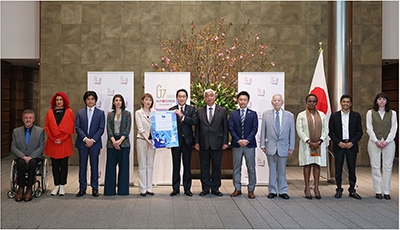 Courtesy call on Prime Minister Kishida by C7 officials and presentation of policy recommendations (April 12, Prime Minister's Office; Photo: Cabinet Public Affairs Office)
Courtesy call on Prime Minister Kishida by C7 officials and presentation of policy recommendations (April 12, Prime Minister's Office; Photo: Cabinet Public Affairs Office)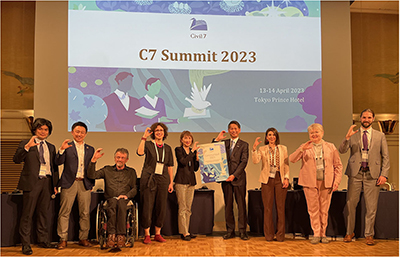 C7 Summit participants pose for a commemorative photo with their right hand making the letter “C” (April 13, Tokyo)
C7 Summit participants pose for a commemorative photo with their right hand making the letter “C” (April 13, Tokyo)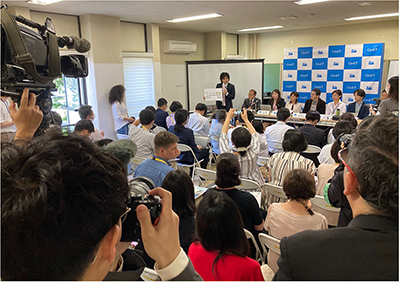 Press conference held by the C7 during the G7 Hiroshima Summit (May 21, Hiroshima City)
Press conference held by the C7 during the G7 Hiroshima Summit (May 21, Hiroshima City)Every year, the C7 organizes a “C7 Summit” in advance of the G7 Summit, with civil society organizations from the G7 Presidency serving as the secretariat, to compile policy recommendations to the G7. In May 2022, the “Japan Civil Society Coalition on G7 Summit 2023” was launched by Japanese NGOs as a secretariat organization for the C7 Summit to be held the following year. When Japan assumed the G7 Presidency in January 2023, six specialized working groups comprising over 700 participants from 72 countries were established in the C7: (1) Nuclear Disarmament, (2) Climate and Environmental Justice, (3) Economic Justice and Transformation, (4) Global Health, (5) Humanitarian Assistance and Conflict, and (6) Open and Resilient Societies. The outcome of the discussions was compiled into policy recommendations titled “Design and Implement Sustainable Policies for Peace, Prosperity, and Transparency,”1 which was handed to Prime Minister Kishida on the day before the C7 Summit. The C7 Summit was held in Tokyo on April 13 and 14 with the participation of civil society representatives from various countries, and the opening ceremony was attended by State Minister for Foreign Affairs YAMADA Kenji. During the G7 Hiroshima Summit, which took place from May 19 to 21, more than 50 press conferences and advocacy activities were held at NGO activity centers set up in Hiroshima City, and civil society insights were provided on many issues facing the international community. This is a good example of how MOFA and civil society can work more closely together by tightly coordinating toward the common goal of a successful C7-related event.
As these efforts suggest, cooperation between MOFA and civil society is very important. The Development Cooperation Charter decided by the Cabinet in June positions civil society as “a strategic partner in Japan's development cooperation” and is expected to see NGOs and other civil society organizations work more closely with the government. Furthermore, input from civil society is extremely useful in addressing the urgent issues facing the international community, and not just those involving development cooperation. This collaboration between the C7 and MOFA has greatly contributed to strengthening cooperation between the two parties. After passing the baton of the G7 Presidency to Italy, MOFA will continue to work with civil society and take advantage of its knowledge toward formulating and implementing foreign policy.
- 1 See here for policy recommendations
https://civil7.org/wpC7/wp-content/uploads/2023/04/C7_communique2023_0412.pdf
(3) Japan Overseas Cooperation Volunteers, Experts and Others
The Japan Overseas Cooperation Volunteers (JOCV, JICA Volunteer Program) is a JICA program in which Japanese nationals from 20 to 69 years of age with skills, knowledge, and experience provide cooperation and assistance for economic and social development of the communities in developing countries while living, working and fostering mutual understanding with local people in developing countries. As of the end of March 2023, 55,385 JOCVs have been dispatched to 99 countries in total since the program's launch in 1965. The dispatched volunteers have been engaged in about 190 types of work in nine sectors: planning/administration, commerce/tourism, public utility works, human resources, agriculture/forestry/fishery, health/medical care, mining, social welfare, and energy. MOFA and JICA are also promoting efforts to utilize the knowledge and experience of ex-volunteers in Japanese society such as educational sites, local communities, and private companies. This unique participatory volunteer program of Japan has been highly appreciated both within and outside of Japan, including recipient countries (See Column on this page).
JICA experts with specialized knowledge, skills, and experience are dispatched to governmental agencies and sites of development cooperation in developing countries. The experts, providing high-level policy recommendations and transferring necessary skills and knowledge to government officials and engineers of the partner countries, work together with their counterparts to develop, promote and disseminate technologies and systems that are suitable to each country's context. These experts, who actively engage in a wide range of sectors, including those addressing basic human needs such as health/medical care and water/sanitation, and those of socio-economic development such as legal system development and formulation of urban planning, contribute to the economic and social development of developing countries and the fostering of mutual trust between Japan and these countries. A total of 7,713 experts were newly dispatched to 103 countries and regions in FY2022, showing a recovery to the level prior to the global outbreak of COVID-19.
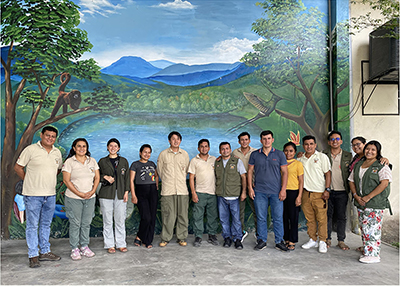 Group photo with colleagues from SERNANP's office for the Alto Mayo Protected Forest (the author is fifth from the left)
Group photo with colleagues from SERNANP's office for the Alto Mayo Protected Forest (the author is fifth from the left)In the summer of 2019, I was accepted into Japan Overseas Cooperation Volunteers (JOCVs) of the JICA Volunteer Program, and at the beginning of the following year, just as I completed pre-departure training and my preparations were in place, my departure was postponed due to the COVID-19 pandemic. I finally arrived in Peru, the country I was posted in, in August 2022. I was assigned to the office for the Historic Sanctuary of Machu Picchu, SERNANP (National Service of Protected Natural Areas by the State) in the Region of Cusco, where I began activities to restore forests degraded by forest fires. From the early days of my assignment, I visited tree planting sites as well as a number of villages in an effort to seek a way to preserve the forests together with local residents. In the midst of this, due to the escalation of protests in southern Peru, including the Region of Cusco following the dismissal of the former president in December 2022, I was forced to evacuate to the capital city of Lima, where I spent three months. My wish to return to Cusco was not fulfilled in the end, and I was then reassigned to the SERNANP's office for the Alto Mayo Protected Forest.
I vividly remember arriving at my new post in Rioja Province, San Martín, amidst a whirlwind of mixed emotions: regret for Cusco, anxiety over a new life in another place, and joy of being finally able to settle myself to start my work. Since we had a limited accumulation of data on native tree species in the vast 182,000 hectares of the protected area, the project began with a monitoring survey of representative native tree species with a view to developing an afforestation plan. In this area, coffee production through agroforestry (planting trees, raising livestock, and cultivating crops among the trees) is thriving. I visit local farmers to ask about their knowledge of the usefulness of each tree species (medicinal trees, fertilizer trees, shade trees, etc.) which they have accumulated through many years of experience, and I try to build up a store of systematic information that will be useful for their future lives. Meanwhile, since the voluntary cooperation of local residents is essential for effective forest conservation, I feel the need to secure their livelihoods as the foundation for such cooperation. As such, in cooperation with the office I am assigned to, NGOs, local government offices, universities, and others, I am working to improve local residents' quality of life through holding workshops for elementary and junior high schools, farmers' associations in protected areas, and women's self-governing committees, not only aiming to raise awareness of the environment, but also covering any necessary topics from marketing, ways to make improvements through “observation, analysis, and judgment,” to nutrition education. Although what I can contribute is neither numerous nor huge, I am working with the hope that the knowledge I have brought from Japan could be of help in the development of this region.
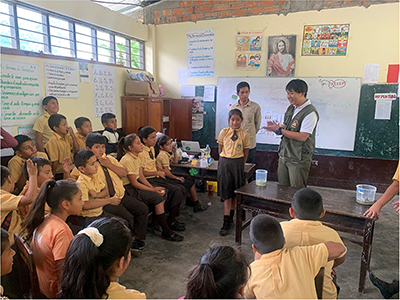 Conducting a class on the importance of conserving water resources at an elementary school near the protected area (the author is in the back on the right)
Conducting a class on the importance of conserving water resources at an elementary school near the protected area (the author is in the back on the right)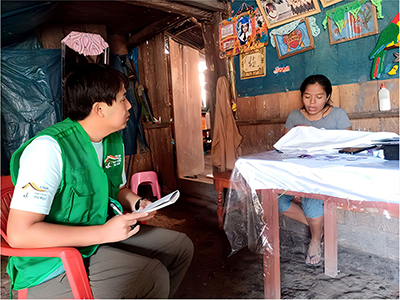 Going door-to-door to interview members of the women's self-governing committee of a village near the protected area (the author is on the left)
Going door-to-door to interview members of the women's self-governing committee of a village near the protected area (the author is on the left)When I was struggling with differences in language and customs, and when I was frustrated by the change of assignment, it was my colleagues, host families, friends, and local residents who supported me. Meeting these people has been an invaluable asset to my experience as a JOCV, and I will continue to work at maximum output for the rest of my term as a way to repay them for their favor.




